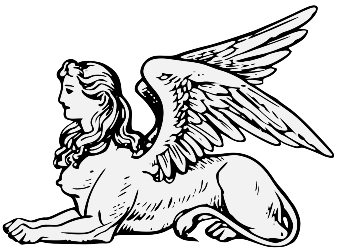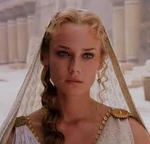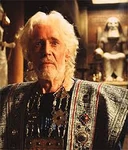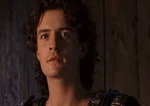- This article is about the epic war film. For the city of the same name, see Troy.
Troy is a 2004 American epic war film produced by Helena Productions and released by Warner Bros. Pictures. It is loosely based on the tale of the Trojan War and the Iliad, a poem by Homer.
It was nominated for 11 awards, winning two (2005 ASCAP Film and Television Music Awards - Top Box Office Film and 2005 Teen Choice Awards - Choice Movie Actor (Brad Pitt)). The film made over US$497 million worldwide, being the 8th highest-grossing film of 2004 and among the top 150 highest-grossing films of all time.
Plot[]

Achilles fights Boagrius
The film begins with Agamemnon, king of Mycenae, having subdued all the Greek kingdoms except Thessaly. The two sides have summoned armies to meet on the field of battle, but Agamemnon proposes single combat between two champions. The king of Thessaly summons Boagrius, while Agamemnon summons Achilles. Although Achilles is unwilling to fight for Agamemnon, Nestor persuades him to do so, saying he can save hundred of men by fighting Boagrius. Achilles kills Boagrius and Agamemnon gains dominion over Thessaly.
Meanwhile, in Sparta, Agamemnon's brother Menelaus is entertaining Princes Hector and Paris, emissaries from Troy. Paris and Helen, Menelaus' wife secretly go upstairs, where it is revealed they have been having an affair. Helen expresses fear because Paris and Hector leave the next day, but Paris has a plan to rescue Helen. The two lovers run away, with Paris smuggling Helen on board a vessel bound for Troy. He later shows her to his brother, who thinks of sending her back, but realises that Paris will only follow her. The ship continues to Troy.
Menelaus, having discovered his wife's flight, has approached his brother for help. He convinces Agamemnon to attack Troy, Agamemnon agrees because he sees this as an opportunity to control shipping in the Aegean by destroying the most important city on the coast of Asia Minor. Agamemnon commands the Greek kings to assemble their forces but Nestor notes that Troy has never fallen before and convinces him that they need Achilles.
Odysseus, king of Ithaca, is sent to Phthia to convince Achilles to join Agamemnon. While there, he meets Patroclus, Achilles' cousin and student. Achilles also meets his mother Thetis, who warns him that if he remains he will live a long happy life but will not be remembered. If he goes to Troy, he will find everlasting glory and renown but will die. Wanting to be remembered, Achilles chooses to go to Troy, summoning his Myrmidons, including Patroclus.
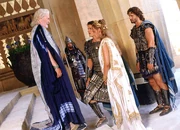
Paris, Helen and Hector return to Troy
Hector, Paris arrive in Troy, where they are greeted by their father, King Priam and their cousin Briseis. Priam is disappointed in Paris' actions but accepts Helen nonetheless. Helen warns Paris that Agamemnon and Menelaus will come for her, but Paris intends to challenge Menelaus to single combat. The combined Greek forces arrive the next day, with the Myrmidons taking the beach of Troy and desecrating the temple to Apollo. During this act of sacrilege, Achilles has Apollo's priests killed and takes Briseis, an acolyte in the temple, as his prisoner.

Priam gives Paris the Sword of Troy
Agamemnon, hearing of Achilles' prize, takes her for himself, angering Achilles, who forces his troops to stay out of the war. The Greek and Trojan armies assemble outside Troy and Paris challenges Menelaus to single combat during a truce. Although having never been in battle, Paris is confident and uses the sword of Troy, a legendary sword used by Priam and his ancestors. Hector advises Paris to defend himself so that Menelaus will tire himself out, but Menelaus is able to remove Paris' shield and cut his thigh, leaving the Trojan prince to limp to his brother. Menelaus and Agamemnon fail to persuade Hector to leave Paris on the field of battle and Agamemnon claims the truce has been violated. Menelaus is killed by Hector after attempting to kill Paris, who is clinging to the feet of Hector. Agamemnon orders the Greeks to attack but they are pushed back by Trojan soldiers on the ground and archers atop the walls. During this time, Ajax the Greater is slain by Hector. Achilles watches Agamemnon retreat and does not intervene, to the dismay of Patroclus.
The Greek forces retreat to the ships and the Trojan forces are pulled back by Hector, seeig that they are within range of Greek archers. Nestor and Odysseus persuade Agamemnon to make amends with Achilles. Achilles taunts Briseis because of her loyalty to Apollo and Briseis question's Achilles' morals and questions why he wants to be a great warrior. She attempts to kill him during the night, but realises that she loves him and so refrains.
In Troy, Priam has assembled his councilors, who advocate attacking the Greeks while they are disadvantaged. Hector, however, notes that the Myrmidons did not fight, surmising that there is dissension within the Greek army. He believes that fighting them now would unite them. Priam orders an attack at daybreak. The Trojan archers use flaming arrows on the ground, lighting small fires. They then roll large balls of over the hill that the Greeks have built. These then burst into flame when they hit the flame, causing havoc in the Greek camp. Odysseus and Achilles organise a resistance but Hector and the Trojans charge into the camp. During the fight, Achilles is slain by Hector, who removes the helmet of the dying man. It is revealed that Patroclus has dressed as Achilles to inspire the Greeks and lead the Myrmidons. Hector puts Patroclus out of his misery and concludes a truce with Odysseus. Achilles is told of his cousin's death and almost strangles Briseis in his anger.
The next day Hector prepares for battle, despite have been begged by his wife Andromache. The night before, Hector showed Andromache a secret tunnel out of Troy, telling her that if he falls, she must rescue as many Trojans as she can and lead them through the tunnel. Hector realises that Achilles will seek him out personally, to avenge Patroclus.

Achilles kills Hector
Achilles, meanwhile, prepares to fight Hector, although Briseis begs him not to fight her cousin as he is a good man. Achilles arrives outside Troy alone, calling out for Hector to face him. Hector farewells Paris, Priam, Andromache and Helen, preparing to meet his fate. Achilles and Hector fight but Hector is eventually brought down by exhaustion. Achilles kills him and drags his body around Troy and back to the Greek camp, as Andromache is consoled by Helen. Achilles returns to his tent and Briseis, upon seeing him, bursts into tears for her cousin.
During that night, Priam approaches the Greek camp in disguise, kisses Achilles' hands and asks for his son's body. Achilles is moved to tears by the old king's pleas and consents to a 12-day truce for Hector's funeral. He even lets Briseis return home with her uncle, commenting that Priam is a far better king than Agamemnon.
Agamemnon is furious at the truce between Achilles and Priam and claims he would rather see all the Greeks die before giving up on his ambition. Odysseus devises a plan to sneak into Troy; the Trojan Horse. During this time, the Myrmidons are ordered to sail back home, with only Achilles remaining. The Trojans accept the horse into the city despite Paris urging his father to burn it. The Greeks in the horse come out after the Trojan celebrations and signal to the Greek army, which pours into Troy.

Troy is sacked
The Greeks begin to burn Troy, stealing gold and pulling down statues. As Priam watches in horror, he claims the Greeks have no honour just before being killed by Agamemnon. Achilles races through the city to find Briseis and Andromache leads Helen and other refugees through the passage. Paris leaves Helen, promising to meet her again in that life or the afterlife. He gives the sword of Troy to Aeneas and goes to find Briseis.

Agamemnon with Briseis, just before she kills him
Briseis, being trapped by Agamemnon, who wishes to enslave her, kills him with a concealed blade while Achilles, finding her, saves her from the Greek guards. Paris sees them both and, despite protests from Briseis, shoots Achilles multiple times, notably in the heel. As Achilles dies, he kisses Briseis, who leaves with Paris through the escape tunnel.
As Odysseus lights Achilles' funeral pyre, he ends the film with the following line;
- "If they ever tell my story, let them say I walked with giants. Men rise and fall like the :winter wheat, but these names will never die. Let them say I lived in the time of Hector, :tamer of horses. Let them say, I lived, in the time of Achilles."
Cast[]
Among the cast is
- Brian Cox as Agamemnon
- Brendan Gleeson as Menelaus
- Diane Kruger as Helen
- John Shrapnel as Nestor
- Julie Christie as Thetis
- Garrett Hedlund as Patroclus
- Brad Pitt as Achilles
- Sean Bean as Odysseus
- Tyler Mane as Ajax the Greater
- Peter O'Toole as Priam
- Eric Bana as Hector
- Orlando Bloom as Paris
- Saffron Burrows as Andromache
- Rose Byrne as Briseis
Inaccuracies[]
Like many films based on mythological events, there are a number of inaccuracies. Some of them are displayed below. Historical inaccuracies, such as the architecture and armour in the film are not mentioned below.
- Agamemnon did not unite all of Greece as Greece was first unified under Alexander the Great
- The Trojan War lasted for ten years, which is not shown in the film.
- Menelaus was not in Sparta when Paris and Helen ran away. Hector never went to Sparta.
- Achilles lived in Phthia, which is spelt as "Phtia" in the film.
- Paris is shown as being raised in Troy, when he was abandoned and left on a hill in an attempt to thwart a prophecy. The episode in which he judges Hera, Aphrodite and Athena is not shown.
- Briseis was not from Troy. She was neither a princess, nor a cousin of Hector. Her role in the film seems to overlap with that of Cassandra, the sister of Hector and a priestess of Apollo.
- The fact that Helen's sister Clytaemnestra, is married to her husband's brother (Agamemnon) is not shown. Neither is the fact that Odysseus is married to Penelope, Helen's cousin.
- When asked by a boy if he is invulnerable, Achilles replies by saying he wouldn't bother with armour if he was. In myth, Achilles could only be killed by piercing his heel, the only part of him not dipped into the Styx by his mother Thetis.
- The concept of Achilles' heel is depicted in the film. Paris shoots Achilles first in the heel, then multiple times in the chest. Achilles removes all the arrows but the first, dying as soldiers witness the single arrow piercing his heel.
- Patroclus and Achilles were not cousins. However, they are sometimes portrayed as lovers.
- Aeneas is shown as a boy and Paris does not seem to know him. In myth, Aeneas was the third cousin of Hector and Paris (their paternal great-grandfathers were brothers), their second cousin (Aeneas' grandmother was Priam's aunt) and their brother-in-law (Aeneas married Hector's sister Creusa). He was also an accomplished warrior, having fought notable Greeks such as Diomedes and Achilles himself.
- Likewise, Aeneas' father Anchises, is not recognised by Paris, despite their close relation.
- Many of the deaths did not occur in the way depicted.
- Ajax was not killed by Hector. They fought for almost a day, but neither gained the upper hand. Ajax committed suicide when he was defeated by Odysseus during Achilles' funeral games. Odysseus won Achilles' armour and Ajax fell upon his sword.
- Achilles was killed by Paris and Apollo soon after Hector's death. Achilles never entered Troy, but his son, Neoptolemus did.
- Paris himself died of an arrow wound inflicted by Philoctetes with the bow of Heracles. After Paris' death, Helen was married to his brother Deiphobus.
- Priam was killed by Neoptolemus, not Agamemnon.
- Agamemnon was killed by his wife, Clytaemnestra and her lover Aegisthus (Agamemnon's cousin).
- Menelaus survived the war. Rather than being killed by Hector (as shown in the film), he won Helen back and returned to Sparta.
- Astyanax, the son of Hector and Andromache, was hurled by Neoptolemus from the walls of Troy.
- The Myrmidons did not leave Troy early.
- Many of Priam's children are not shown, neither are Troy's numerous allies or notable Greek peoples such as Diomedes and his Argives. Priam's wife Hecuba, is also noticeably absent.
- Andromache was enslaved by Neoptolemus, but later married Hector's brother Helenus, after Neoptolemus died.
- Priam refers to Achilles' father as having prematurely died. Achilles died before his father Peleus. Achilles led the Myrmidons because Peleus was too old to journey to Troy himself.
- Troy is mentioned by Nestor as having never fallen before. In myth, Troy had fallen during Nestor's lifetime; Hercules and Ajax's father Telamon had sacked Troy while it was ruled by Priam's father Laomedon. Priam rebuilt the city, which prospered under his rule.
- A major missing element in the film is the role of the Greek gods, who incessantly interfered in the war, picking sides and protecting their favourites.
- As a result of this, the following are omitted;
- Achilles mocks Apollo for not avenging the desecration of his temple and the murder of his priests. In myth, Apollo sent a plague to the Greeks because Agamemnon took Chryseis, the daughter of Apollo's priest Chryses, as a captive. A plague sent by Apollo is mentioned by Troy's high priest, but this is actually a ruse devised by Odysseus, to trick the Trojans into believing the Greeks had retreated. Apollo also takes his revenge by guiding Paris' arrow into Achilles' heel, his only weak spot.
- The plain before Troy was occupied partially by two rivers; the Scamander and Simoeis. The gods of these two rivers supported the Trojans, drowning many Greeks.
- The parentage of many of the characters is not shown. Helen, Agamemnon, Menelaus, Priam, Paris, Hector, Aeneas, Odysseus, Ajax and Achilles are all direct descendants of Zeus. Helen, in particular, is Zeus' daughter. Likewise, Aeneas is the son of Aphrodite.
- As a result of this, the following are omitted;
Gallery[]
| Films based on mythology | |
|---|---|
| 1960's | Hercules and the Conquest of Atlantis |
| 1970's | Monty Python and the Holy Grail |
| 1980's | Clash of the Titans | Hellraiser |
| 1990's | The Mask | Hercules | Hercules and Xena - The Animated Movie: The Battle for Mount Olympus |
| 2000's | Pan's Labyrinth | Troy | Dark Kingdom: The Dragon King | Death Note |
| 2010's | Clash of the Titans | Thor | Immortals | Dracula Untold | Wrath of the Titans | Hercules | Tokyo Ghoul | Draug | The Huntress: Rune of the Dead | Valhalla | Hell Girl |
| 2020's | The Northman |
